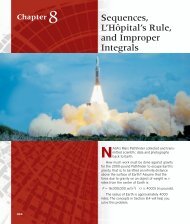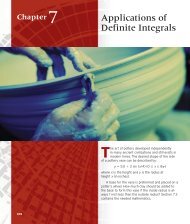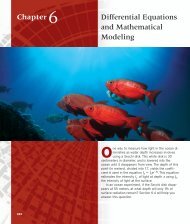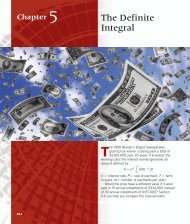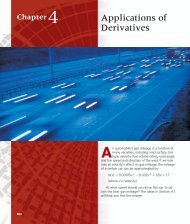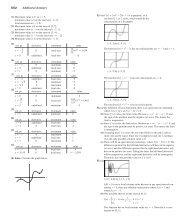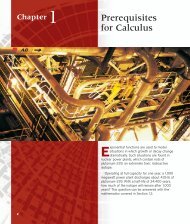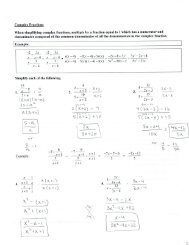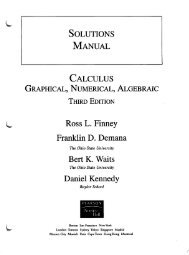5128_Ch03_pp098-184
Create successful ePaper yourself
Turn your PDF publications into a flip-book with our unique Google optimized e-Paper software.
Section 3.7 Implicit Differentiation 161<br />
Rational Powers of Differentiable Functions<br />
We know that the Power Rule<br />
d<br />
x d x<br />
n nx n1<br />
holds for any integer n (Rules 2 and 7 of this chapter). We can now prove that it holds<br />
when n is any rational number.<br />
RULE 9 Power Rule for Rational Powers of x<br />
If n is any rational number, then<br />
d<br />
x d x<br />
n nx n1 .<br />
If n 1, then the derivative does not exist at x 0.<br />
Proof Let p and q be integers with q 0 and suppose that y q x p x pq . Then<br />
y q x p .<br />
Since p and q are integers (for which we already have the Power Rule), we can differentiate<br />
both sides of the equation with respect to x and obtain<br />
qy q1 d y<br />
px<br />
dx<br />
p1 .<br />
If y 0, we can divide both sides of the equation by qy q1 to solve for dydx, obtaining<br />
d y px<br />
<br />
dx q y<br />
p1<br />
q 1<br />
p q • x<br />
p1<br />
x pq<br />
q 1<br />
p q • x<br />
p1<br />
x<br />
p<br />
pq<br />
y x p/q<br />
q<br />
p (q 1) p q<br />
p <br />
p • x<br />
p1 ppq<br />
A<br />
q<br />
law of exponents<br />
p q • x pq1 .<br />
This proves the rule.<br />
■<br />
By combining this result with the Chain Rule, we get an extension of the Power Chain<br />
Rule to rational powers of u:<br />
If n is a rational number and u is a differentiable function of x, then u n is a differentiable<br />
function of x and<br />
d<br />
u d x<br />
n nu n1 d u<br />
,<br />
dx<br />
provided that u 0 if n 1.<br />
The restriction that u 0 when n 1 is necessary because 0 might be in the domain of<br />
u n but not in the domain of u n1 , as we see in the first two parts of Example 6.



